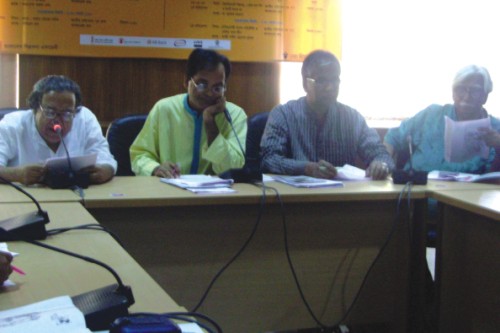|
Seminar
Analysing Al Deen
Ershad Kamol
As a playwright Selim Al Deen was an icon, he developed a unique style based on the traditional performing art forms of Bangladesh. After Rabindranath Tagore, Al Deen was the first playwright whose characters successfully represent our culture. Al Deen has successfully synthesised the epic quality with the traditional theatre of the masses. Going beyond the colonial mindset Al Deen developed theories on theatre and applied those theories in his plays.
Selim Al Deen as a playwright has been critically analysed at the two-day seminar held recently at the Bangladesh Shilpakala Academy. The programme was a part of the six-day Selim Al Deen birth anniversary celebration jointly organised by Dhaka Theatre and Bangladesh Shilpakala Academy.
Seminar papers were presented by Professor Arun Sen, Mafidul Haque, Dr. Lutfar Rahman and Kazi Syeed Hosain Dulal.
Professor Arun Sen in his paper, Selim Al Deen: Bektigoto O Bektigogo Chhariye has expressed his own observation of Al Deen as a foreign playwright and theoretician. Professor Sen's paper states that he is impressed by Al Deen's creativity, especially his craftsmanship and wonderful ability of depicting indigenous culture. Being a little critical on Al Deen as a theoretician, Professor Sen's paper reads that his theories may be very important for him, however, many of his theories such 'Panchali' creates controversy and is not representative of his writings. Moreover, he focused on the difference between Al Deen's texts and Dhaka Theatre's productions of these texts directed by Nasiruddin Yousuff.

(From L-R) Professor Arun Sen, Professor Afsar Ahmed, Nasiruddin Yousuff and Poet Mohammad Rafiq at the seminar.
Mafidul Haque's paper Prachya: Sattwar Khonje Natok is nothing but a lengthy synopsis of Al Deen's play Prachya. More insightful papers are expected at the seminars. Only at the concluding paragraph of the paper Mafidul Haque appreciated Selim Al Deen for writing such an aesthetically rich play like Prachya.
Dr. Lutfar Rahman's paper Dwoitadwoitobadi Shilpatatwa: Selim Al Deen O Joiboti Konyar Mon is insightful in this that he has analysed Al Deen's theory Dwoitadwoitobadi Shilpatatwa. Moreover, Al Deen's play Joiboti Konyar Mon has been analysed from that theory.
Rejecting the western concept of 'dramatic conceit' essential for play, Al Deen developed his own theory Dwoitadwoitobadi Shilpatatwa, which means that drama is the incorporation of all art forms. According to Dr. Rahman's paper, Al Deen got the idea from Medieval religious guru Sri Chaitanya's philosophy of Achintadwaitadwoitohad.
Dr. Lutfar Rahman's paper begins with Al Deen's quotation to make people understand Dwoitadwoitobadi Shilpatatwa, which states, "I'll not object if anybody labels Chaka (Al Deen's play) as poetry, nor even will I mind if it is labelled as a story. I always have tried that my plays go beyond the parameters of drama and incorporate all art forms."
Kazi Syeed Hosain Dulal in his paper titled Oitijyabahi Bangla Natyariti O Selim Al Deen analyses the influence of the traditional art forms in Selim Al Deen's plays. Dulal has included that Al Deen has got the ideas for writing all of his plays by watching performances of traditional artists at different corners of the country. As references, Dulal has used even the title of the plays that were written in 1970s, which is controversial. Selim Al Deen in an interview with The Daily Star even said that all of his early plays (before 1980s) were western influenced and even the Al Deen experts also claim that Al Deen acquired his own style based on indigenous performing art forms from Kittonkhola, which was written in the early 1980s.
An additional attraction of the series of seminars was the participation of theatre enthusiasts at the open discussions after each paper had been presented. They not only expressed their own views but also critically analysed the papers presented at the seminar. They even questioned the nature of criticism in the country, which has not developed properly.
The organisers deserve plaudits for arranging such an insightful programme, as it was something beyond the tradition. The usual practice is to only focus on the positive aspects of a literary figure during such seminars which often leaves out a proper evaluation. The seminar tried to break this tradition by having an objective discussion of Al Deen's work.
Copyright (R) thedailystar.net 2008 |
